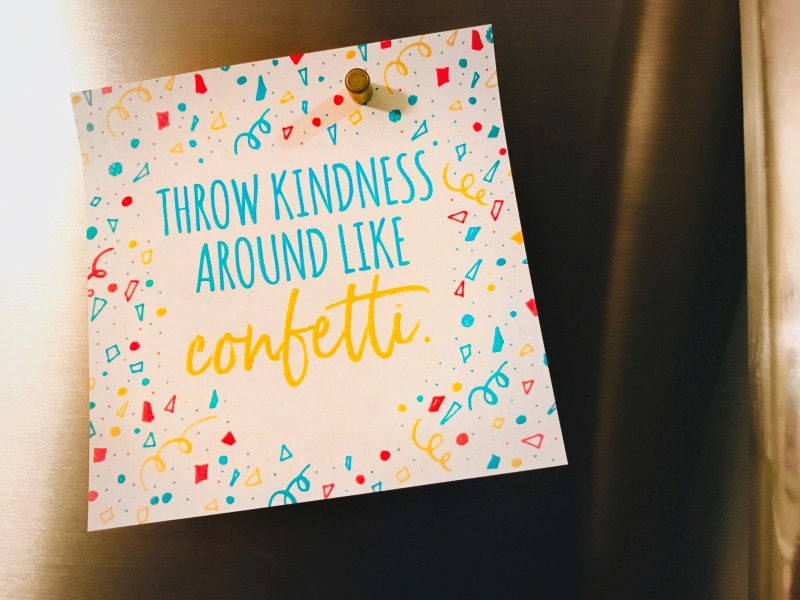3 Ways to Promote Kindness at Work, According to CEOs

One of the best pieces of leadership advice I’ve heard didn’t come from a management guru or a TED Talk. Instead, the source was the 2002 movie Spider-Man, when an earnest Uncle Ben told Peter Parker, unaware of his nephew’s super hero identity, that “With great power comes great responsibility.”
That adage certainly rings true in business. When you are the CEO or President of an organization, everyone else is paying close attention to your actions and words. As author Jim Whitehurst noted in this 2016 Harvard Business Review article, your behaviors frequently impact the tone of the culture as much as business performance.
Basically, if you act like a jerk, that signals doing so is an acceptable, even desirable behavior for getting ahead – even though an avalanche of research has shown that fostering a positive environment is critical for engaging employees. But if you model and promote constructive behaviors like kindness in the workplace, it helps your organization reach its full potential.
I define a culture of kindness as one where showing others mutual respect, compassion and support is widely valued and reinforced. Whether you are a billion-dollar entity or a scrappy start-up, adopting those behaviors will benefit your bottom-line.
Recently I had the pleasure of speaking with three chief executives who lead organizations that normalize kindness at work – Scott Carter, the Chief Executive Officer of National DCP, a global provider of innovative supply chain solutions for the foodservice industry; Janet Traphagen, President of Creative Group, Inc., a full-service global meeting, incentive and recognition company that delivers business results by inspiring people to thrive; and Rick Harber, Founder and CEO of Decision Digital, a strategic information technology firm that serves a diverse, referral-only global client base.
From those discussions, here are 3 ways CEOs say you can promote kindness at work:
1. Be Intentional.
Scott Carter had already built a successful $2 billion organization when he realized things could be better, starting with himself. In 2015, he intentionally began focusing on speaking less, listening more, and seeking the opinions of others first in meetings.
Now that’s a major change for any corporate environment, where people have been conditioned for years to look to the most senior leader for validation and direction. For Carter, it was about growing as a leader and looking for new ways to impact company performance.
“I see kindness in the workplace as valuing everybody’s opinion, giving them the opportunity to participate and allowing people to be comfortable enough to take risks, make mistakes, recover and improve the business,” he explained. “Trying to understand people’s different backgrounds and experiences is powerful for the whole organization.”
Determined to continue its growth, the company implemented a formal Culture of Accountability initiative several years ago to encourage team members to share open, honest feedback with each other. It took some practice, as individuals had to develop routines and tasks around that intention. And that focus paid off for NDCP.
“Learning how to give and receive feedback in a safe, respectful way throughout the organization drove better collaboration and really unlocked levels of performance that we’d never experienced before,” said Carter. “Turnover is down, certainly in our extended leadership team. I’ve got people that want to be here who are problem solvers, not finger pointers. We’ve built an incredible culture.”
2. Get personal.
Many of the tenants of Decision Digital’s culture – listening, empowerment, inspiration, recognition, and gratitude – are rooted in kindness. Rick Harber reinforces those values by creating a positive environment that gets personal in celebrating accomplishments and promoting a strong quality of life.
Everyone receives their birthday as a paid day off. Over the years, they have closed the office and taken staff to the premier of movies like Star Wars, Star Trek, and The Matrix. People are encouraged to prioritize activities that are important to them.
“I’ve learned that many people aren’t just motivated by money but quality of life,” said Harber. “An extra week of vacation versus another $10,000 in pay. Leaving early on a Thursday to coach little league baseball. Working remote a few days a week. In today’s work world, you may not be able to compete on salary, but you can compete on culture.”
“Leading with kindness and making that a core value that is spoken about, accomplishes the number one goal of a CEO: enabling your people to get out of their own way,” he continued. “It drives them to form deep habits of success within your company. Remember, you can enable them to succeed but cannot make them successful.”
3. Create psychological safety.
It’s not surprising that Creative Group, Inc., practices what they preach. After all, the market leading company has spent over 50 years designing programs that help their customers inspire desired employee behaviors. Kindness, a critical part of their core beliefs championed by Janet Traphagen, is encouraged throughout the organization.
“Kindness is not a soft skill, it’s a human skill. It is critical for people to perform at their best and thrive, which directly impacts your bottom-line,” said Traphagen. “I want to bring kindness, humanity, authenticity and vulnerability into the workplace and make that okay.”
Traphagen has been passionate about practicing kindness at work since it was extended to her years ago and changed her life. She believes that a kind culture is tied deeply to creating an environment of psychological safety that allows individuals to thrive.
“There’s a direct connection between being seen and letting people know they are safe to explore their wildest, wackiest ideas. You are safe to fail, and we will not shame or blame you,” she noted. “When people are genuinely supported and valued as a human being, they will take more risks. They will bring forward more crazy ideas that might just change your business.”
That proved to be especially true for their company after the COVID-19 pandemic struck in March 2020. The hospitality and travel sectors plummeted, when all clients were forced to cancel big group meetings during the shutdown. It was a dark time for event planners; reductions had to be made and people were furloughed.
Traphagen started leading weekly virtual town hall discussions with her team when their offices closed, thinking it would be a temporary measure. She ended up conducting these honest conversations about the state of the business through the end of the year. Keeping people informed, respected, and treated with kindness was the top priority in navigating incredibly difficult circumstances. It became a safe place to explore ideas and take risks.
As a result, the team created and launched millions of dollars’ worth of new product offerings in less than six months without outside investment. Creative Group finished 2020 profitable because people felt safe to innovate, trusted and extended grace to each other, and were willing to have healthy debates when they disagreed.
Tip: Think about CEOs you may have worked with or heard about who created positive, high-performing cultures by prioritizing kindness. How did their kindness take shape and form? Was it a personalized note recognizing an accomplishment, or perhaps taking the time to learn about a challenging experience and offering their support? Identify the one or two actions they displayed that resonate the most with you. Then practice that behavior in your own work environment for a couple of weeks. How is it impacting others and the way you lead and perform?
Looking for a step-by-step process to help you get unstuck and stay that way for good? Check out Free and Clear: Get Unstuck and Live the Life You Want. It is chock-full of helpful tips, easy-to-use tools and inspirational stories of individuals who overcame obstacles against the odds.
